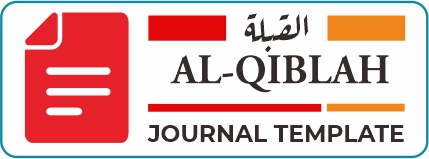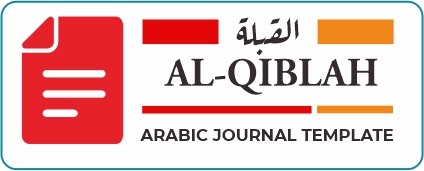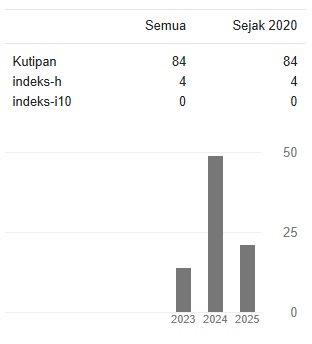Keterkaitan Sifat Sabar dan Optimisme dalam Hadis Nabi: Tinjauan Tekstual dan Kontekstual serta Relevansinya dengan Terapi Self-Talk Positif
The Relationship Between Patience and Optimism in the Prophet's Hadith: A Textual and Contextual Review and Its Relevance to Positive Self-Talk Therapy
DOI:
https://doi.org/10.36701/qiblah.v3i6.1751Keywords:
Patience, Optimism, If Only, Disasters, Self-Talk PositiveAbstract
This research aims to determine the relationship between patience and optimism based on the perspective of the hadith of the Prophet Muhammad. This research is descriptive research using library methods and a ma'ani hadith study approach. The results of this research found several things. First, the Hadith of Abu Hurairah which is the basis of this research is considered valid in terms of sanad and matan. Second, textually, Abu Hurairah's hadith emphasizes the importance of faith, physical strength and enthusiasm in worship and encourages people to be serious in their efforts while asking for Allah's help, and to be patient when facing disaster without saying "if only". Third, contextually this hadith emphasizes the importance of being patient with disasters without saying "if only" because this is contrary to the patient attitude commanded by Allah in the Qur'an so that the value of patience must be reflected in actions and words, as well as avoiding behavior or words that criticize the decrees. God. Fourth, the relevance of this hadith is very strong in everyday life where humans are commanded to try to obtain goodness through hard work, asking Allah for help, and avoiding laziness and weakness. When facing adversity, this hadith teaches the importance of being patient, being kind, and avoiding attitudes that show rejection of Allah's decrees. This research is also in line with modern psychology approaches through positive self-talk therapy, to build an attitude of optimism and a positive mindset in facing life's challenges.
Downloads
References
Al-Quran al-Karim
Buku:
Abu ‘Āshim, Abū Bakr. al-Sunnah. Cet. I; Beirut: al-Maktab al-Islami, 1400.
Abu Hātim, ‘Abdul Rahman bin Muhammad. Al-Jarh wa al-Ta’dil. Cet. I; Beirut: Dar Ihya al-Turats, 1952.
Ahmad, Arifuddin. Metodologi Pemahaman Hadis. Cet. XI; Makassar: Alauddin University Press, 2013.
Al-‘Asqalāni, Aḥmad bin ‘Ali bin Ḥajr. Tahzib al-Tahzib. Cet. I; India: Matba’ah Dairah al-Ma’arif, 1326.
Al-‘Asqalāni, Aḥmad bin ‘Ali bin Ḥajr. Taqrib al-Tahzib. Cet. I; Suriah: Dar al-Rasyid, 1986.
Al-Asy’as, Abū Dāwud Sulaimān. Sunan Abu Dāwud. Cet. I; Beirut: Dar al-Risalah al-‘Ilmiyyah, 2009.
Al-Baihaqi, Aḥmad bin al-Ḥusain. al-Sunan al-Kubra. Cet. III; Beirut: Dar al-Kutub al-‘Ilmiyyah, 2003.
Al-Bazzar, Aḥmad bin ‘Amru. Musnad al-Bazzār. Cet. I; al-Madinah al-Munawwarah, 2009.
Al-Bukhāri, Muḥammad bin Ismā’il. Sahīh al-Bukhāri. Cet. I; Dar Tauq al-Najat, 1422.
Al-Dzahabi, Muhammad bin Ahmad bin ‘Utsman. Siyar A’lam al-Nubala. Cet. III; Beirut: Muassasah Al-Risalah, 1405 H.
Al-Hajjāj, Muslim. Sahīh Muslim. Beirut: Dar Ihya Turas al-‘Arabi.
Ibn Hajr, Aḥmad bin ‘Ali. Fath al-Bāri. Beirut: Dar al-Ma’rifah, 1379.
Ibn Ḥanbal, Aḥmad bin Muḥammad. Musnad Aḥmad. Cet. I; Beirut: Muassasah al-Risalah, 2001.
Ibn Ḥibbān, Muḥammad. Saḥīh Ibn Ḥibban. Cet. I; Beirut: Muassasah al-Risalah, 1988.
Ibn Ḥibbān, Muhammad. al-Siqat. Cet. I; India: Dairah al-Ma’arif, 1973.
Ibn Manzūr, Muḥammad bin Mukrim bin ‘Ali. Lisān al-‘Arab. Cet. III; Beirut: Dar Sadir, 1414.
Ibn Sa’ad, Muḥammad. al-Tabaqat al-Kubra. Cet. I; Beirut: Dar al-Kutub al-‘Ilmiyyah, 1990.
Ibn Sa’ad, Muḥammad. al-Tabaqat al-Kubra. Cet. II; Madinah Munawwarah: Maktabah al-‘Ulum wa al-Hikam, 1408.
Ibn Sunni, Aḥmad bin Muḥammad.‘Amal al-Yaum wa al-Lailah. Jeddah: Dar al-Qiblat.
Ibn Taimiyyah, Aḥmad bin ‘Abdul Halim. al-Ihtijaj bi al-Qadr. Cet. IV; Beirut: al-Maktab al-Islami, 1404.
Al-‘Ijliy, Aḥmad bin ‘Abdullah. Ma’rifah al-Tsiqat. Cet. I; Madinah Munawwarah: Maktabah al-Dar, 1985.
Al-Jauhari, Ismā’il bin Ḥammād. al-Sihāh Tāj al-Lugah wa Sihāh al-‘Arabiyah. Cet. IV; Beirut: Dar al-‘Ilm, 1987.
Al-Jauziyyah, Muḥammad bin Abū Bakr bin Qayyim. Risālah Ibn Qayyim Ilā Ahadi Ikhwānihi. Cet. I; Riyad: Matabi’ al-Syarq al-Awsat, 1420.
Al-Jurjāni, ‘Ali bin Muḥammad. al-Ta’rifāt. Cet. I; Beirut: Dar al-Kutub al-‘Ilmiyyah, 1983.
Al-Mausili, Abu Ya’la Aḥmad bin ‘Ali. Musnad Abū Ya’la. Cet. I; Damaskus: Dar al-Mamun, 1984.
Al-Mizzi, Yusuf bin ‘Abdul Rahman. Tahzib al-Kamal. Cet. I; Beirut: Muassasah al-Risalah, 1980.
Mūsa, ‘Iyād. Ikmāl al-Mu’lim bi Fawāid Muslim. Cet. I; Mesir: Dar al-Wafa, 1998.
Al-Nasāi, Aḥmad bin Syu’aib. Sunan al-Nasāi. Cet. I; Beirut: Muassasah al-Risalah, 2001.
Al-Nawawi, Yaḥya bin Syaraf. al-Minhāj Syarah Sahīh Muslim. Cet. II; Beirut: Dar Ihya al-Turas al-‘Arabi, 1392.
Al-Qazwaini, Muḥammad bin Yazīd. Sunan Ibn Mājah. Cet. I; Beirut: Dar al-Risalah al-‘Ilmiyyah, 2009.
Al-Rūyāni, Muḥammad bin Ḥarun. Musnad al-Ruyani. Cet. I; Kairo: Muassasah Cordoba, 1416.
Al-Taḥāwi, Aḥmad bin Muḥammad. Syarah Musykil al-Asar. Cet. I; Beirut: Muassasah al-Risalah, 1494.
Al-Tirmizi, Muḥammad bin ‘Isa. Sunan al-Tirmizi. Cet. II; Mesir: Syarikah Maktabah wa Matba’ah Mustafa al-Babi, 1975.
Al-Zabīdi, Muḥammad bin Muḥammad. Tāj al-‘Arūs. Dar al-Hidayah.
Kementerian Agama RI. Al-Quran dan Terjemahannya. Jakarta: Pustaka al-Fatih, 2009.
Situs:
Kemdikbud. Kamus Besar Bahasa Indonesia. https://kbbi.web.id/sabar (Diakses pada tanggal 23 September 2024)
World Health Organization (WHO), “Bunuh Diri”, Situs Resmi WHO. https://www.who.int/news-room/fact-sheets/detail/suicide (23 September 2024).



 FOCUS AND SCOPE
FOCUS AND SCOPE EDITORIAL TEAM
EDITORIAL TEAM












